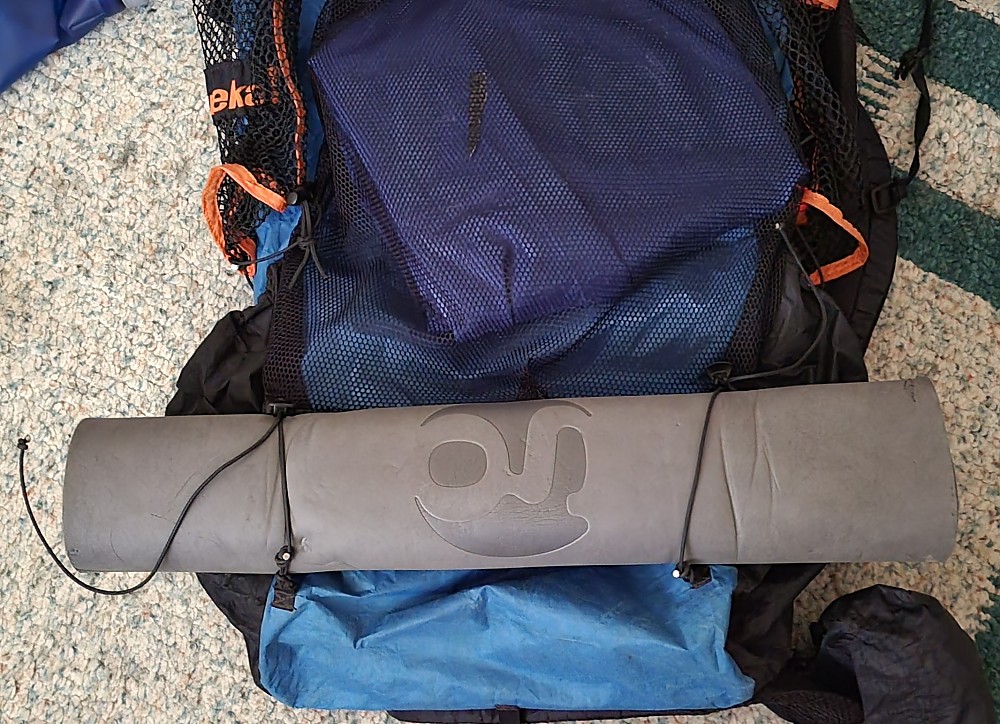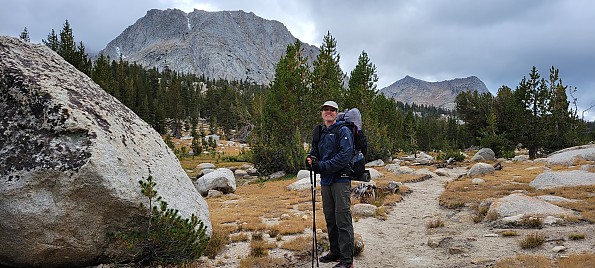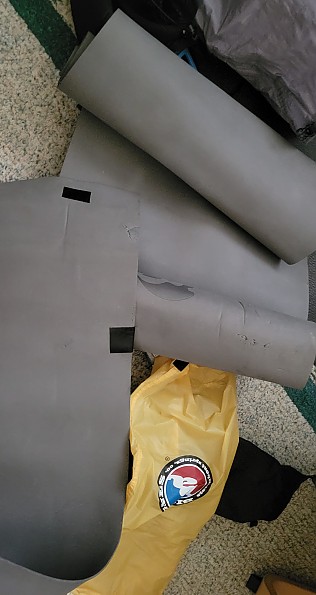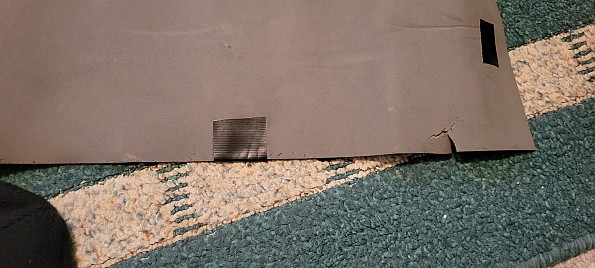Gossamer Gear Thinlight Foam Pad - 1/8"

Too fragile, rips on the edges when attached to pack. Very little R value.
Pros
- Lightweight—2.5 oz
- Not too expensive
- Tiny amount of R-value
- Some cushion
Cons
- Fragile
- Not much R-value
- Not much cushion
- Not a great value
After reading all the reviews I thought this would be great to help protect my Exped HL duo pad from punctures, add a small amount of R-value and some cushion to sit on.
I would say it fails at all of these and is rather pointless.
My wife and I have carried these on trips to Olympic National Park and Yosemite National Park. And after 10 or so days on the trail, we are seeing lots of tears.
We are using them rolled up and strapped to the back of our packs. And they stick out a little to the sides of the pack. Which is really bad. Anything that could snag these, will tear them at the edges.
Putting anything on them seems to leave a scuff or permanent impression.

The thin straps on our Z packs have made deep grooves on the pads and even torn a little where the tensioner hits the pad. So we have learned these have to be attached very loosely to the pack. Also ensure they are rolled up perfectly straight. Any edges of the pad that protrude out will tear. We would roll, then sort of thump on the ends to get them all evenly rolled. And even then, we still got tears on the edges.



We thought we could use them on the beach at Olympic National Park. But we found a tarp/poncho was much easier to clean sand off and just as comfortable. So that was strike number one.
We thought we could use them as sit pads around camp. Nope, the pine needles poked right through and the area would have to be completely free of debris not to damage the pads. Strike two.
After 10 days and 120 miles of use we now have 5-6 rips and tears on each one. Particularly the edges where I mention they stick out a little past the packs. But also where a rock or pine needle went right through them.
We did lay them out under our pad and I think it gave us a little bit of protection from ground debris. But way less than our footprint or thicker "egg carton" style pad.
The pad is way too thin to be used by our old bodies as a single source of padding for sleeping. And the R-value is so minimal that I really can't see any value. In Yosemite temps dropped to 20°F at night. This was pushing the limits of our R 3 Exped HL. We had hoped the ThinLights, would be our saving grace—nope. We had cold backs and wished we had something more insulating under us. Strike three.
So overall, these are too fragile and really don't serve enough purpose to justify their purchase and I cannot recommend them.
If you really want a closed cell pad, get something thicker and more durable. These are very light, and of little real use.
Background
Been using closed cell pads since 1984.
Source: bought it new
Price Paid: $22
I use a short length of this for: sitpad, insulation booster, and tent surfing prevention.
Pros
- Light
- Waterproof
- Insulating
- Not slippery
Cons
- Low melt temperature. Be careful when using it as a windshield for your stove
I find a length bit of this waterproof insulation generally very useful. About 50g, or a bit over a meters worth. Torso length. Good to use as a sit pad on breaks .
It is also exceptionally good at stopping my Ether Light mat slipping around on the DCF tent floor at night, AKA tent surfing. Makes it stick like glue.
And of course it adds insulation value. So it's all good.
Background
Various sit pads and sleeping mats.
Source: bought it new
A little thin for use as a sleeping pad by itself (for me), this shines when used in addition to the Gossamer Gear torso length pad. On most nights I tuck my empty backpack under my feet at night to provide a little insulation from the cold ground. In frosty conditions I carry a small square of this material to be used under my feet and legs as I sleep. Works great! This is not for cushion and comfort, this is merely to stop conductive heat loss. So simple, so light. Nothing to break, pop or leak.
I took this 1/8" pad on a 10 day trek on the John Muir Trail in August 2008. I intended to use it for a bit of ground insulation, but I ended up using it for a lot more.
We all want to get comfortable when taking a break on the trail, but often that is hard to do. Sharp rocks and pine needles, pebbles, etc. -- ouch. The answer: this pad.
I packed it at the top of my pack, folded up, and grabbed it whenever I took a break. I would sit on it or lie on it: instant comfort. It took a bit of wear and tear from this use, but that's OK -- better wear and tear on it than on me.
At only about 2 oz., this is a no-brainer. My base pack weight was about 19 lbs., not including food and water (but including a bear canister), and the pad was a very welcome addition.
I'll use it again next summer when I finish up the JMT.
Your Review
Where to Buy
You May Like
Specs
| Price |
MSRP: $9.00 Historic Range: $16.00 Reviewers Paid: $22.00 |
| Weight |
1.9 - 2.1 oz (54 - 60 g) |
| Dimensions |
19.5 x 59 x 1/8 in (50 x 150 x .318 cm) |
| R-value |
~.45 |



